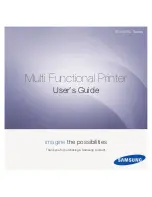
Verifying Acceptable Spatial Resolution, Artifact Levels and
Low Contrast Visibility
WARNING:
Good viewing conditions are important for the correct
interpretation of both diagnostic and test images. Make sure
that the light box intensity (luminance) is between 2000 and
4000 cd/m² (4500 and 6500 °K). Use a magnifying glass and use
shutters to collimate. Make sure the ambient light is low.
To verify acceptable spatial resolution, artifact levels and low contrast
visibility, proceed as follows:
1.
Print the QC Test image or use the previously printed QC Test image used
to establish the daily operating density levels.
2.
Visually check the QC test image for artifacts: no significant disturbing
artifacts should be visible.
3.
Check the spatial resolution in each of the three circles. Within each circle
there are three groups, each consisting of five dots. All five dots of each
group must be visible with a magnifying glass. The smallest cluster of 5
dots is only visible if the viewing conditions are good.
4.
Check the Low Contrast Visibility at both the high (100 / 95%) and low
end (0 / 5%) of the density scale. You should be able to see the circle in
the square and the upper circle.
5.
Record these values at the top of Chart 3 (‘Artifacts and Spatial Resolution
Control Chart’).
6.
These charts will be used for the weekly quality test.
WARNING:
In case of significant artifacts or insufficient spatial resolution,
the reason must be found and the problem solved before any
further clinical films can be printed.
Related Links
on page 95
Charts for general radiography QC
on page 139
Performing the weekly QC tests
on page 103
Preventive maintenance schedule
on page 120
Dry 2.4M | Advanced Operation (key-operator mode) |
101
2652B EN 20210601 1655
















































